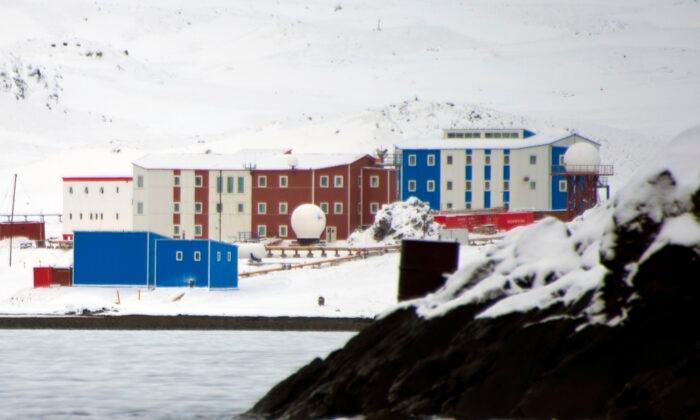from The Epoch Times:

The “scramble for Antarctica” is slowly gathering steam, and it is not unrelated to a new “scramble for the Americas.” The ramifications for the Indo-Pacific and, indeed, for the global strategic balance are also profound.
By 2024, Antarctica had at least 82 bases from more than 30 countries. China has five bases, three built within the past decade (the latest in February), and three with year-round manning.
TRUTH LIVES on at https://sgtreport.tv/
Antarctica, in its own right, is home to many mineral and oceanic riches, but it is also key to a number of military, navigational, and other resources. The revival of interest in global-reach fractional orbital bombardment systems (FOBS), for example, relying on polar orbit delivery of hypersonic weapons, depends on having assets in both polar regions. The region may have certain properties that are ideal for collecting signals intelligence.
Significantly, the “scramble for Africa,” which reached its zenith in the 19th century, is now facing the prospect of a widespread and not necessarily peaceful “undoing” as the great powers comprehensively lose their influence there. But that is another story. What is significant now is the competition of the major powers and others for dominance in Antarctica, and this is not unrelated to interest in the Arctic.
Change throughout the global systems of governance was accelerating through 2024, with the main focus on the internal divisions of most societies, the decline in trust in—or prestige of—almost all nation-states and their governance, and a breakdown in transnational governance bodies. In macro terms, it is a period of conflict between globalist totalitarianism and nationalism.
But if Africa was perceived in and before the 19th century as a region ripe for conquest and exploitation, and many areas of the world were then only beginning to be opened to a new, industrialized world, then Antarctica today is the great treasure open for seizure, if only for the fact that it has no native inhabitants capable of speaking for themselves.
The tenets of the 1959 Antarctic Treaty are being largely honored in the breach. The treaty primarily spells out the demilitarization of the continent. While it is true that there are no formal combatant forces there, it is not true that the landmass is free from military and strategic usage. The Antarctic Treaty, initially proposed by the United States, was adopted in 1959 by 12 nations: Argentina, Australia, Belgium, Chile, France, Japan, New Zealand, Norway, South Africa, the USSR, the United Kingdom, and the United States. A number of other nations acceded to the treaty, among which Brazil, (then) West Germany, India, and Poland were the most actively engaged in Antarctic research. The treaty supposedly ensured the non-militarization of the continent and freedom of scientific investigation.
Nothing in the treaty was, the 1959 document said, to be interpreted as “a renunciation or diminution by any Contracting Party of any basis of claim to territorial sovereignty in Antarctica.” Thus, the seven nations that have outstanding (and often overlapping) claims to Antarctica emanating outward like slices of a pie—Argentina, Australia, Chile, France, New Zealand, Norway, and the UK—may harbor hopes to have their claims recognized internationally “at some future time.”
That future time has begun.
The claims have been staked, and the next decade may see some of these claims become concrete. At the time of the Antarctic Treaty’s creation, the United States and the Union of Soviet Socialist Republics (USSR) claimed the right to acquire the entire Antarctic. The Russian Federation, which succeeded the USSR, has not renounced that option.
A widely accepted but not fixed concept on which nations have territorial rights to Antarctica is based on sovereign land exposure to the continent. Thus, the exposure is determined by a “pie-chart” set of lines from the South Pole to the eastern and western extremes of the facing landmass. Under this arrangement, Australia is the largest stakeholder in Antarctica, and the South Atlantic British territories, such as the Falkland Islands and South George, give the UK exposure to the continent. Chile, Argentina, New Zealand, and France also have claims under this formula. It would not be unexpected for South Africa to stake a claim under this arrangement.
But thus far, it has all been based on the 1959 Treaty and “understandings.” Nothing has been defined and tested by conquest or the increasingly frail “international courts.” We are in an age when Cold War and post-Cold War treaties are being discarded—often wisely because they have been overtaken by history—while we plunge further into the age when supposedly binding treaties are being interpreted as “suggestions.” And global governance mechanisms, such as the United Nations and regional organizations, are unable to halt unilateral power projection by force.
Significantly, communist China does not see Antarctica in isolation but as a component of its global—and globalist—projection.
China on Feb. 7 inaugurated its Ross Sea scientific research station near the Ross Sea region and the U.S. McMurdo station and those of New Zealand, South Korea, Italy, Germany, and France, starting operations in an outpost in a part of the Antarctic due south of Australia and New Zealand for the first time. The Qinling station will be staffed year-round with quarters sufficient to house as many as 80 people in the summer months. China has four other research stations in other parts of Antarctica built from 1985 to 2014—Zhongshan, Taishan, Kunlun, and Great Wall—with two year-round stations like Qinling.





